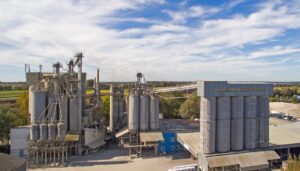
Kreisel, a member of the Fixit Group, has completed the construction of a building materials and systems plant in the village of Pisky (Lviv region), with investments in the project amounting to almost EUR 14 million, the press service of the Lviv Regional State Administration reports.
“First of all, we thank you for supporting our project, as it is of great importance not only for our company but also for Europe. One of our main tasks is to create conditions for the development of the local economy, attract investment and create new jobs,” Michael Kraus, Director of the Eastern Europe region of the Fixit Group, was quoted in the press release.
According to him, the company is currently in the process of commissioning and preparing documents to obtain a certificate of commissioning.
The concern pays special attention to local staffing and training. Thus, specialists were certified and trained to maintain the equipment, which made it possible to ensure commissioning without the involvement of foreign installation teams.
According to the press release, Rava-Rus Lyceum will also become the company’s partner in training professional staff. In addition, it is planned to launch an academy in Lviv region that will specialize in training specialists for the construction industry.
Representatives of Kreisel and the Lviv Regional State Administration also discussed the possibility of setting up wind farms to power socially important facilities.
As reported, construction work at the Kreisel plant in Lviv region began in August 2021.
Founded in 2004, Kreisel Building Materials LLC is a subsidiary of Austrian Roefix AG and is part of the international concern Fixit Gruppe, one of the leading suppliers of building materials. The concern unites five brands: Fixit, Greutol, Hasit, Kreisel and Röfix.
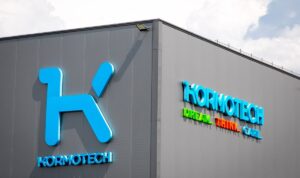
Leading Ukrainian pet food manufacturer Kormotech has started construction of a new plant in Lithuania, in which it will invest EUR60 million, of which EUR40 million is provided by the European Bank for Reconstruction and Development (EBRD), according to Vitaliy Koval, Minister of Agrarian Policy and Food.
“I took part in the ceremony of laying the capsule for the expansion of the Kormotech plant. This is the largest Ukrainian producer of animal feed, which not only conquers the European market but also continues to scale thanks to its powerful entrepreneurial energy. Today, it is important for Ukrainian business to develop its presence in European markets without losing momentum,” he wrote on Telegram.
According to the minister, Kormotech is expanding its existing facilities in Lithuania, where it will create 200 new jobs to complement the team of 170 Ukrainian and Lithuanian specialists and the development of related industries. In addition, the company’s products in this country will have some Ukrainian components.
“One of our priorities in the Ministry of Agrarian Policy is to open new markets and expand existing ones. I am confident that Kormotech’s production facilities will enable other Ukrainian companies to enter the European market or increase their presence there,” Koval said and thanked the Lithuanian partners for supporting Ukrainian entrepreneurs who are becoming part of the European economy.
Kormotech is a global family-owned company with Ukrainian roots that has been producing cat and dog food under the Optimeal, Club 4 Paws, Woof! and Meow! brands since 2003. The company has production facilities in Ukraine and the EU, with a product range of over 650 items. Its focus on exports and geographical diversification helps it withstand the impact of Russia’s war against Ukraine.
In 2023, Kormotech’s turnover increased by 22.5% to $152 million from $124 million in 2022. The ratio of sales abroad and in Ukraine in tons is now 31% to 69%, respectively (in 2022 it was 28% to 72% in Ukraine).
Kormotech brands grew most dynamically in the markets of Romania (+35%), Poland (+11%) and Moldova (+11%).
Kormotech is a leader in Ukraine, one of the world’s top 50 pet food producers and one of the top 21 most dynamic pet food brands. The ultimate beneficiaries of Kormotech are Olena and Rostyslav Vovk.
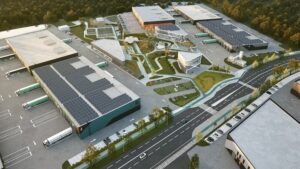
Pozhmashyna Industrial Company (Pryluky, Chernihiv region) has signed an agreement with the Formatsiya.Lviv industrial park to build a new plant, the company reports on its Facebook page.
“The day of January 31, 2025 will go down in the history of not only our company, but also in the history of Ukrainian engineering (…). Realizing all the military and other risks, we are investing $15 million in Ukraine, in the development of the country’s industry, and in job creation,” the statement said.
The construction period is two years.
“Despite everything – a full-scale invasion, all the difficulties and risks, the shameful attitude of the authorities to business that exists today – we, an industrial company, did not run away, did not close production, did not lay off people,” Pozhmashina emphasizes.
As reported, after the outbreak of full-scale hostilities, Pozhmashina partially relocated its production facilities to Lviv.
Pozhmashyna produces a wide range of firefighting, rescue and specialized equipment, and has repeatedly supplied special equipment to the State Emergency Service of Ukraine.
According to the Clarity Project, in 2023, the company increased its net profit by 19.3% year-on-year to UAH 537.7 million, while net revenue increased 2.2 times to UAH 2 billion 093 million. In January-September 2024, net profit decreased by 2.8 times compared to the first nine months of 2023 to UAH 189.3 million, while revenue more than halved to UAH 946.7 million.
Oleg Averyanov is the founder and ultimate beneficiary of Pozhmashina Industrial Company.
Formatsiya.Lviv Industrial Park was included in the register of industrial parks in October 2023. The concept envisages the location of manufacturing enterprises with a total area of over 150 thousand square meters and the creation of 3,600 jobs on an area of over 30 hectares.
The park was created by Alterra Group in cooperation with Lviv City Council, Kyiv School of Economics and the Ministry of Economy of Ukraine.
In December 2024, the park received more than UAH 114 million in funding from the Ministry of Economy under the “Made in Ukraine” program for the construction and development of infrastructure.
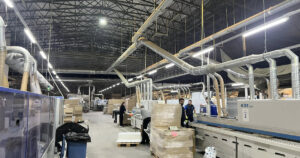
Cabinet furniture manufacturer Accord Import (Khmelnytsky) will almost triple its production capacity by building a new plant in Khmelnytsky, where it plans to create 140 jobs, according to Dmytro Kysylevsky, deputy chairman of the Verkhovna Rada Committee on Economic Development.
“Construction of a new cabinet furniture plant has started in Khmelnytsky. The project’s investor is Accord Import. After the new plant is launched, its production capacity will increase from 420 thousand square meters to 1.2 million square meters of cabinet furniture per month. This will allow the company to enter the top 5 manufacturers of cabinet furniture in Europe,” he wrote on his Facebook page on Tuesday.
According to the MP, the amount of investment in the new project is $14 million. The launch of the first production lines is scheduled for July 2025, and the new plant should reach full capacity in September.
Kisilevsky noted that a 1.1 MW solar power plant has been built and an additional 2.8 MW is under construction to meet the electricity needs, and a gas piston plant has been purchased.
“Currently, the existing Accord Import facility is 100% utilized. About 70% of the company’s orders for cabinet furniture come from the international retail chain JYSK, which in 2025 increased the volume of orders for cabinet furniture from Ukraine by a third,” Kysylevsky wrote.
According to the company’s Facebook page, Raiffeisen Bank has extended the term of the credit line under this contract, which was granted at the end of 2023, and the term of the ECA insurance contract for Accord Import.
“Thus, Raif and ECA have supported furniture exports for 2025 to Denmark, the Netherlands, Hungary, Bulgaria, Poland, Sweden, Germany and Spain,” the company wrote.
According to Kysylevsky, Accord Import exports 96% of its products to the EU, and the launch of the new plant will expand the geography of exports to the Middle East, South Asia, and South America.
The MP also clarified that the owners of Accord Import, the Grabar family, started out as furniture importers, while now it is Ukraine’s largest exporter of cabinetry.
He also added that to replace the imports of cellular cardboard used by the company for furniture packaging, another company is currently under construction in Khmelnytsky Oblast to produce this product.
“And the supplier of wooden boards for Accrod Import is Kronospan, which has recently launched a production line in Rivne region,” Kysylevsky added.
According to the Clarirty Project, Accord Import LLC was registered in Khmelnytskyi in August 2015. The company’s authorized capital is UAH 42.105 million, and the owners are Mykola, Ruslan, and Vadym Hrabar in equal shares.
In January-September 2024, the company increased its net profit by 23% compared to the same period in 2023 to UAH 120.6 million, with net revenue growing by 27% to UAH 1 billion 271 million.

The U.S. Development Finance Corporation (DFC) has approved a loan of up to $40 million for Astarta, Ukraine’s largest sugar producer, at the sub-council level.
“(The loan) will assist in the construction and operation of a soy protein processing plant with a projected annual capacity of about 100,000 tons and help Astarta make other investments,” DFC said on its website.
At the same time, the International Finance Corporation (IFC) of the World Bank Group announced at the end of November 2024 that it was considering a $40 million loan to Astarta and a parallel $40 million loan for the construction of a soy protein concentrate plant in Poltava region. The recipient of the funds is Astarta Agro Protein LLC, a subsidiary of Astarta Holding plc.
It was noted that IFC has already assisted the agricultural holding in conducting market research, preparing a business plan for the project, and assessing its commercial viability in order to interact with potential investors.
Initially, the IFC Board of Directors planned to consider this project on December 20, but then postponed it to February 28, 2025.
As reported, in 2024, Astarta began investing in the construction of a plant for processing soybean meal into soy protein concentrate with a capacity of 500 tons per day (about 100 thousand tons per year) in the Globinsky Industrial Complex (Poltava region). The agricultural holding will invest over EUR 76 million in equipment and technology and create 110 new jobs.
“Astarta and its structural unit Astarta Agro Protein signed the first investment agreement with the Ukrainian government to receive compensation from the state for significant investments. As part of the agreement, the government will provide the agricultural holding with a number of incentives, including exemptions from import duties on new equipment, import VAT on new equipment and income tax for up to 5 years.
IFC recalled that Astarta commissioned a soybean processing plant in Globyno in December 2013. In 2023, it processed 232 thousand tons of soybeans, 73% of which were grown by the agricultural holding, and produced 172 thousand tons of soybean meal. In the first half of 2024, the share of the plant’s own raw materials increased to 90%.
Soybean concentrate is produced by processing soybean meal with higher added value. It serves as a raw material for the production of animal feed.
In 2023, the agricultural holding reduced its net profit by 5.0% to EUR61.9 million, and its EBITDA decreased by 6.1% to EUR145.77 million, while revenue increased by 21.3% to EUR618.93 million.
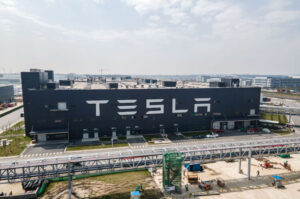
American electric vehicle manufacturer Tesla plans to complete the construction of a plant in Shanghai to produce Megapack energy storage devices by the end of this year, Xinhua news agency reported, citing a statement from the company’s local office.
Construction of the plant began in late May. The plant covers an area of about 200 thousand square meters, and the total investment in this project is estimated at about 1.45 billion yuan ($202 million).
The facility will be Tesla’s first energy storage project outside the United States and the company’s second plant in Shanghai after the electric vehicle gigafactory, with total investments exceeding 50 billion yuan.
Mass production of Megapack at the new facility is expected to begin in the first quarter of 2025. At the initial stage, the production volume will be 10 thousand drives per year, which is equivalent to approximately 40 GWh of electricity.
Megapack is a 3.9 MWh battery for energy storage and power supply support, its use contributes to the stability of power grids and prevents interruptions in their operation, according to Tesla’s website. The American company already has a Megapack production plant in California with a capacity of 10 thousand units per year.